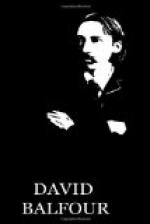No sooner said than done; nor was I long under the bield of a hillock before she appeared at the inn door, looked here and there, and (seeing nobody) set out by a path that led directly seaward, and by which I followed her. I was in no haste to make my presence known; the further she went I made sure of the longer hearing to my suit; and the ground being all sandy, it was easy to follow her unheard. The path rose and came at last to the head of a knowe. Thence I had a picture for the first time of what a desolate wilderness that inn stood hidden in; where was no man to be seen, nor any house of man, except just Bazin’s and the windmill. Only a little further on, the sea appeared and two or three ships upon it, pretty as a drawing. One of these was extremely close in to be so great a vessel; and I was aware of a shock of new suspicion, when I recognized the trim of the Seahorse. What should an English ship be doing so near in France? Why was Alan brought into her neighbourhood, and that in a place so far from any hope of rescue? and was it by accident, or by design, that the daughter of James More should walk that day to the seaside?
Presently I came forth behind her in the front of the sand hills and above the beach. It was here long and solitary; with a man-o’-war’s boat drawn up about the middle of the prospect, and an officer in charge and pacing the sands like one who waited. I sat immediately down where the rough grass a good deal covered me, and looked for what should follow. Catriona went straight to the boat; the officer met her with civilities; they had ten words together; I saw a letter changing hands; and there was Catriona returning. At the same time, as if this was all her business on the Continent, the boat shoved off and was headed for the Seahorse. But I observed the officer to remain behind and disappear among the bents.
I liked the business little; and the more I considered of it, liked it less. Was it Alan the officer was seeking? or Catriona? She drew near with her head down, looking constantly on the sand, and made so tender a picture that I could not bear to doubt her innocency. The next, she raised her face and recognised me; seemed to hesitate, and then came on again, but more slowly, and I thought with a changed colour. And at that thought, all else that was upon my bosom—fears, suspicions, the care of my friend’s life—was clean swallowed up; and I rose to my feet and stood waiting her in a drunkenness of hope.
I gave her “good-morning” as she came up, which she returned with a good deal of composure.
“Will you forgive my having followed you?” said I.
“I know you are always meaning kindly,” she replied; and then, with a little outburst, “But why will you be sending money to that man? It must not be.”
“I never sent it for him,” said I, “but for you, as you know well.”
“And you have no right to be sending it to either one of us,” said she. “David, it is not right.”




